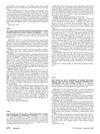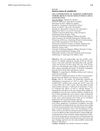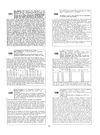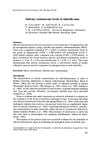 1 citations,
January 2020 in “Recent Research in Genetics and Genomics/Recent Research in Genetics and Genomics ”
1 citations,
January 2020 in “Recent Research in Genetics and Genomics/Recent Research in Genetics and Genomics ” High doses of Lepidium sativum seed extract are toxic and should be used with caution.
 October 2020 in “Journal of Pakistan Association of Dermatology”
October 2020 in “Journal of Pakistan Association of Dermatology” Finasteride appears safe for long-term sperm concentration, but more research is needed for clear conclusions.
 1 citations,
January 2018 in “PubMed”
1 citations,
January 2018 in “PubMed” Women with PCOS have a similar chance of getting pregnant using assisted reproductive treatment as those without PCOS.
[object Object]  2 citations,
September 2008 in “Fertility and Sterility”
2 citations,
September 2008 in “Fertility and Sterility” Adult offspring of sperm donation generally feel positive about their conception and view the donor as their biological father.
 December 2023 in “Urogenital tract infection”
December 2023 in “Urogenital tract infection” Seminal bacteria can lower sperm quality in subfertile men.
 104 citations,
May 2019 in “F1000Research”
104 citations,
May 2019 in “F1000Research” Losing weight, fixing varicoceles, and using advanced sperm selection methods improve male infertility treatment outcomes.
 54 citations,
September 2013 in “Fertility and Sterility”
54 citations,
September 2013 in “Fertility and Sterility” Finasteride can reduce fertility in some men, but stopping it increases sperm count.
 34 citations,
January 2004 in “Revista do Hospital das Clínicas”
34 citations,
January 2004 in “Revista do Hospital das Clínicas” Finasteride may worsen infertility in men with existing issues, but stopping it can improve sperm health.
[object Object] 16 citations,
January 2017 in “Asian journal of andrology/Asian Journal of Andrology” Men who start puberty later may have lower sperm quality and different hormone levels in adulthood.
 15 citations,
January 2017 in “Advances in Experimental Medicine and Biology”
15 citations,
January 2017 in “Advances in Experimental Medicine and Biology” 5α-Reductase inhibitors can negatively affect male sexual function and, in some cases, significantly reduce sperm count, but these effects may be reversible.
 15 citations,
October 2012 in “International Urology and Nephrology”
15 citations,
October 2012 in “International Urology and Nephrology” Low-dose finasteride may cause fertility issues, but stopping it can improve sperm quality and lead to pregnancy.
 8 citations,
December 2016 in “Revista Medica De Chile”
8 citations,
December 2016 in “Revista Medica De Chile” Finasteride can cause sexual dysfunction, sperm changes, and affect bone density and metabolism.
 5 citations,
December 2012 in “PubMed”
5 citations,
December 2012 in “PubMed” Stopping the use of the drug finasteride can improve sperm count and does not prevent normal conception, but caution is advised when trying to conceive.
 4 citations,
October 2020 in “Toxicology Mechanisms and Methods”
4 citations,
October 2020 in “Toxicology Mechanisms and Methods” Hesperidin protects rat testicles from finasteride damage and improves sperm health.
 3 citations,
April 2012 in “Fertility and Sterility”
3 citations,
April 2012 in “Fertility and Sterility” Finasteride may cause infertility in rats by affecting epididymis and sperm function.
 2 citations,
September 2017 in “Archives of Medical Science”
2 citations,
September 2017 in “Archives of Medical Science” Finasteride affects offspring's antioxidant enzymes in epididymis, possibly disrupting sperm maturation.
 2 citations,
January 2015 in “Springer eBooks”
2 citations,
January 2015 in “Springer eBooks” Environmental factors and exposure to toxins may contribute to male infertility by affecting sperm and hormone function.
 2 citations,
January 2011 in “Yearbook of Urology”
2 citations,
January 2011 in “Yearbook of Urology” Stopping finasteride can improve sperm count in infertile men.
 1 citations,
July 2023 in “F&S Reviews”
1 citations,
July 2023 in “F&S Reviews” Some common medications may harm male fertility by affecting hormones, sperm production, and sexual function.
 1 citations,
September 2013 in “Fertility and Sterility”
1 citations,
September 2013 in “Fertility and Sterility” Finasteride discontinuation increases sperm count in men.
 1 citations,
September 2013 in “Fertility and Sterility”
1 citations,
September 2013 in “Fertility and Sterility” Finasteride may improve sperm count in subfertile men with low sperm count.
 1 citations,
May 2011 in “Journal of Human Reproductive Sciences”
1 citations,
May 2011 in “Journal of Human Reproductive Sciences” Finasteride may decrease semen quality but not harm sperm production, and stopping the drug can improve semen quality; hyperprolactinemia can cause infertility but is treatable with medication.
 July 2023 in “The journal of sexual medicine”
July 2023 in “The journal of sexual medicine” Anabolic-androgenic steroids harm male hormone levels, sperm, metabolism, and can cause acne, hair loss, and breast growth.
Finasteride impairs sperm quality and fertility in rats, even after stopping treatment.
 October 1988 in “Pediatric research”
October 1988 in “Pediatric research” Certain maturity signs appear before and after the first release of sperm in boys.
 June 2021 in “Archives of Advances in Biosciences”
June 2021 in “Archives of Advances in Biosciences” Finasteride reduces sperm count and quality and alters hormone levels in mice.
January 2018 in “日本薬理学会年会要旨集 =” Stopping finasteride improves sperm quality but not semen volume in young men.
 August 2015 in “Dermatologica Sinica”
August 2015 in “Dermatologica Sinica” Men with severe hair loss may have poorer sperm quality.
 5 citations,
August 1987 in “Andrology”
5 citations,
August 1987 in “Andrology” Men with low or no sperm count have lower salivary testosterone levels, and saliva testing can measure their testosterone well.
 5 citations,
June 2008 in “Acta Cirurgica Brasileira”
5 citations,
June 2008 in “Acta Cirurgica Brasileira” Finasteride causes sperm production decrease in Mesocricetus auratus.



























